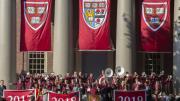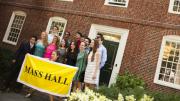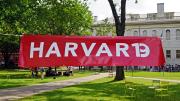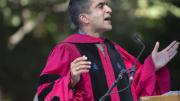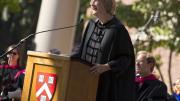Wearing blazers, bow ties, and summer dresses, members of the College class of 2019 walked into Tercentenary Theatre as a group for the first time, stopping to pose for photographers—and taking the occasional “selfie”—at the annual Freshman Convocation on Tuesday afternoon. Then, sitting under a bright September sun and clear blue skies, they listened intently as their deans, older peers, and President Drew Faust spoke on themes of diversity, community building, and self-discovery.
After a welcome by dean of freshmen Thomas Dingman, an invocation by the Reverend Doctor Lucy Forster-Smith, and a beautiful rendition of “Walk Together, Children” by the Holden Choruses, Danoff dean of Harvard College Rakesh Khurana took the podium, welcoming the Class of 2019 to Harvard. Known for being a “present” dean who values student interaction (and has a popular Instagram feed), Khurana emphasized to the freshmen that the next four years should be about taking a path of self-discovery, and not jumping “through another series of hoops” to prove themselves.
“You were already admitted to Harvard, and you all belong here,” he said. “And we hope your experience of college will be one not of showing the world what you can do, but, rather by discovering what you want to do—and also what needs to be done—and figuring out how you can use your talents to create the life you envision—and the world you envision.”
Khurana urged the first-years to make their time at the College a transformational experience rather than a transitional one. A transformational experience, he pointed out, is rooted in intellectual exploration, connecting with people who are different, reflecting on what one has learned, and deciding what kind of person one wants to be. Instead of gravitating toward people who are like those they knew in high school, he said, the new undergraduates should actively seek connections with different people. “When you pursue these connections, you will come to realize that every person’s story is valid, meaningful and worthwhile,” he explained. “And you will discover in that process that you can connect to people in ways you never imagined. This willingness to connect with others different from you will serve you well as you prepare to enter our global society.”
If they instead simply use these next four years as a résumé-building experience, the dean said, freshmen will miss out on the best of what Harvard has to offer. Pursuing a transformational path will not be easy, he warned, and will lead students to ask themselves if they are doing Harvard “the right way.” But by facing these doubts, he emphasized, they will start to develop the self-confidence and leadership skills this world so desperately needs.
“A test of leadership is taking a stand based on what you think is right, even if success is not assured,” Khurana said. “If we are to tackle our most important challenges as a society—poverty, environmental degradation, and justice, to take some examples—we need citizens and citizen leaders who are comfortable with being uncomfortable.”
President Faust spoke on similar themes, telling students not to make their time at Harvard about pursuing one more trophy to impress others. She urged the freshmen to ask themselves deep questions during their college lives: How will you use your time over the next four years? What will you mean to one another? Who will you be in May 2019? And where are you, anyway?
The next four years, Faust said, should be about discovery—“discovery of the world and its past and future; discovery of one another and discovery of yourself.” Trying something new—like archaeology, crew, Hindi, theater—she added, would help freshmen open their eyes and rethink their assumptions.
And, she emphasized, “You will learn as much from one another as from any other part of your Harvard experience. And your differences will be a significant part of the work of discovery you undertake here. Take advantage of Harvard to surprise yourself. Make sure you are a different person by May of 2019.”
